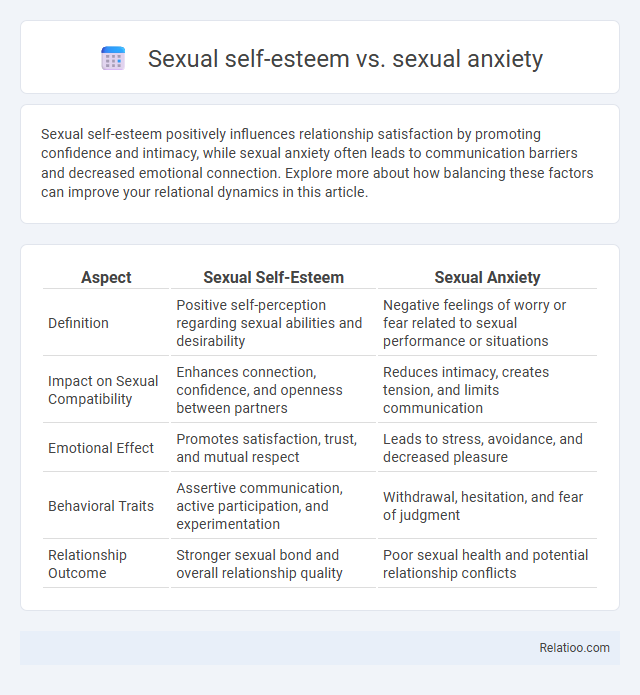Sexual self-esteem positively influences relationship satisfaction by promoting confidence and intimacy, while sexual anxiety often leads to communication barriers and decreased emotional connection. Explore more about how balancing these factors can improve your relational dynamics in this article.
Table of Comparison
| Aspect | Sexual Self-Esteem | Sexual Anxiety |
|---|---|---|
| Definition | Positive self-perception regarding sexual abilities and desirability | Negative feelings of worry or fear related to sexual performance or situations |
| Impact on Sexual Compatibility | Enhances connection, confidence, and openness between partners | Reduces intimacy, creates tension, and limits communication |
| Emotional Effect | Promotes satisfaction, trust, and mutual respect | Leads to stress, avoidance, and decreased pleasure |
| Behavioral Traits | Assertive communication, active participation, and experimentation | Withdrawal, hesitation, and fear of judgment |
| Relationship Outcome | Stronger sexual bond and overall relationship quality | Poor sexual health and potential relationship conflicts |
Understanding Sexual Self-Esteem
Sexual self-esteem reflects Your confidence and positive feelings about your sexual identity and abilities, directly impacting intimate relationships and overall well-being. Unlike sexual anxiety, which involves fear or worry related to sexual performance or situations, sexual self-esteem fosters a healthy, affirming sense of self in sexual contexts. Understanding sexual self-esteem helps distinguish empowering self-beliefs from the inhibiting effects of sexual anxiety, promoting a balanced and fulfilling sexual experience.
Defining Sexual Anxiety
Sexual anxiety refers to feelings of fear, worry, or discomfort related to sexual activity, which can negatively impact your sexual experiences and confidence. Unlike sexual self-esteem, which involves a positive perception of your sexual worth and abilities, sexual anxiety often stems from concerns about performance, body image, or past negative experiences. Understanding sexual anxiety is crucial for addressing how it interferes with your sexual self-esteem and overall well-being.
Core Differences Between Sexual Self-Esteem and Sexual Anxiety
Sexual self-esteem reflects an individual's positive evaluation of their sexual worth and abilities, fostering confidence and satisfaction in intimate experiences. In contrast, sexual anxiety involves feelings of fear, worry, or unease related to sexual performance or encounters, often leading to avoidance or distress. The core differences lie in sexual self-esteem promoting healthy sexual functioning and well-being, while sexual anxiety undermines confidence and can inhibit sexual expression or pleasure.
Psychological Factors Affecting Sexual Self-Esteem
Psychological factors such as past traumas, body image perceptions, and interpersonal relationship quality significantly influence sexual self-esteem, often determining an individual's confidence and comfort in sexual situations. Sexual anxiety, frequently stemming from fear of judgment, performance concerns, or unresolved emotional issues, can undermine sexual self-esteem by creating negative associations with intimacy. Enhancing sexual self-esteem requires addressing cognitive distortions, improving emotional regulation, and fostering open communication to reduce sexual anxiety and promote a positive self-concept.
Common Causes of Sexual Anxiety
Sexual anxiety often stems from factors such as past trauma, performance pressure, and negative body image, which can significantly impact an individual's sexual self-esteem by undermining confidence in intimate situations. Low sexual self-esteem and sexual anxiety frequently coexist, where diminished self-worth exacerbates anxiety symptoms, creating a cycle that hinders sexual satisfaction and overall well-being. Addressing common causes like unrealistic expectations, communication issues, and psychological stress is crucial for improving sexual self-esteem and reducing sexual anxiety.
How Sexual Self-Esteem Influences Sexual Relationships
Sexual self-esteem significantly shapes how you experience intimacy, influencing confidence and satisfaction within sexual relationships. High sexual self-esteem fosters open communication, reduces sexual anxiety, and promotes a healthy connection with your partner. Low sexual self-esteem, conversely, can increase sexual anxiety, leading to difficulties in expressing desires and achieving emotional and physical fulfillment.
Impact of Sexual Anxiety on Intimacy and Connection
Sexual anxiety can significantly hinder intimacy and connection by creating barriers to open communication and mutual vulnerability. Your sexual self-esteem may decline as anxious thoughts interfere with your ability to fully engage and express desires, leading to feelings of inadequacy or avoidance. Addressing sexual anxiety is crucial to enhancing emotional closeness and fostering a healthy, satisfying sexual relationship.
Overcoming Sexual Anxiety: Strategies and Tips
Sexual self-esteem reflects your confidence and positive perception of your sexual identity, while sexual anxiety involves feelings of fear, worry, or discomfort related to sexual activities. Overcoming sexual anxiety requires strategies such as open communication with your partner, mindfulness techniques to reduce stress, and seeking professional guidance if needed to enhance your overall sexual well-being. Building sexual self-esteem involves focusing on positive self-acceptance and gradually confronting fears, which ultimately empowers your confidence and satisfaction in intimate relationships.
Building and Nurturing Sexual Self-Esteem
Building and nurturing sexual self-esteem involves cultivating a positive self-image and confidence in your sexual identity and experiences, which directly reduces sexual anxiety by fostering comfort and acceptance within your body and desires. Emphasizing open communication, self-awareness, and healthy boundaries strengthens your sexual self-esteem, leading to a more fulfilling and empowered intimate life. Prioritizing these practices helps transform negative feelings and fears into a balanced, confident sexual self-concept.
Professional Support and Resources for Sexual Well-Being
Professional support for sexual well-being addresses sexual self-esteem by providing tailored counseling and therapy that enhances your confidence in intimate situations. Resources such as sex therapists, support groups, and educational workshops can effectively reduce sexual anxiety by offering coping strategies and fostering open communication. Prioritizing these services ensures comprehensive care that nurtures a positive sexual self-image and promotes emotional health.

Infographic: Sexual self-esteem vs sexual anxiety
 relatioo.com
relatioo.com